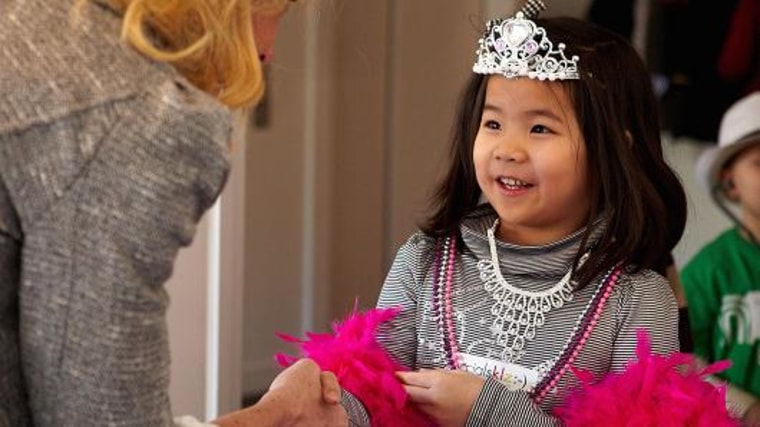On a recent Saturday morning in New York, a group of students practiced making eye contact and smiling when they introduced themselves, learned how to make a phone call and worked on shaking hands properly with the help of Velcro gloves.
After, they sat down to a formal meal replete with china and crystal tableware, at which they were taught how to make a toast.
These were not newly minted MBA graduates preparing to enter the business world. They were 5-year-olds.
The two-hour workshop was one of 18 classes taught by Faye de Muyshondt, who founded Socialsklz four years ago to help youngsters learn manners.
She now teaches more than 100 children and teens every week in her center on the Upper West Side. She is opening a branch in Greenwich, Conn., next month and another in New Jersey soon after.
"We sign our kids up for soccer, tennis and Lego-building. But we never spend time on this skill set, and it's going to impact their lives more than anything," said de Muyshondt. "Parents are starting to realize that kids need to be taught these skills."
Experts say that technologies such as texting have impaired children's ability to conduct polite conversations, and that the culture of helicopter parenting is producing an overindulged, inconsiderate generation who lack the wherewithal to behave appropriately.
A number of small businesses across the country instruct children in everything from using cutlery correctly to making friends. A new off-Broadway musical, "Piggy Nation," is aimed at teaching manners in an entertaining way.
Many etiquette instructors have backgrounds in education or public relations, which have helped them develop fun ways to teach reluctant tots to mind their p's and q's.
Rachel Isgar, the owner of Los Angeles-based Please Pass the Manners, used to be a math and phonics tutor.
On a whim, she offered a few etiquette courses, which sold out. She started a business focused solely on etiquette two years ago and now takes groups of up to 15 children to restaurants for lessons on civilized dining. The price for the 90-minute session is $50 a child, and the best-selling class is the one for 5- to 8-year-olds.
"The concept of the family dinner is eroding, and everyone comes to the table with smartphones," Isgar said. "Children have lost the art of conversation."
Some feel the problem goes deeper than that.
Tami Kimball decided to teach etiquette classes after becoming a Girl Scout leader for a group of 7-year-olds in Dallas.
"I was amazed at how many of these kids had poor manners," said Kimball, whose 7-, 8- and 9-year-olds always address adults by their surnames and look people in the eye when they introduce themselves.
The troop members "didn't know not to keep their feet off the furniture, or that they had to ask me if they could have a Coke," she said.
After buying a curriculum online, Kimball launched Embracing Etiquette offering weekly after-school classes. She also teaches workshops for Girl Scouts and is holding a session at a local country club on writing thank-you cards. Her charge is $120 for a six-week program.
Parents say they recognize the need for their kids to learn these things and that it's easier to have someone else teach them.
"Mommy can say, 'You can't eat your meal with your hands' 100 times, but mommy's saying it and they won't listen," said Stephanie Kaster, a Manhattan mother whose 10-year-old boy and 11-year-old girl have attended many classes at Socialsklz, where a two-hour class is $75.
"It's another thing when a child learns something with a group of peers," she added.
Both parents and etiquette teachers stress that the primary goal of these classes is to provide kids with the tools they need to navigate social challenges.
For example, Kaster's daughter has attended workshops at Socialsklz covering topics such as how to get along with 12 girls in a bunk at sleepaway camp.
"These classes prepare you not only for the dinner table but for everyday life," she said. "What to do if someone says something mean, how to approach people. Knowing these things gives kids more self-confidence."
—Miriam Kreinin Souccar, Special to CNBC
Awkward teens have pay disadvantage later in life
Get smart! Your phone habits are annoying at work
